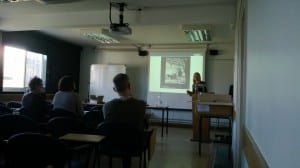Presenting your Research training
By Sarah B Dhanjal, on 17 May 2013
Last Saturday (11th May) we held our second workshop. The theme was ‘Presenting Your Research’ and focused on thinking about exhibiting and interpreting your research to a wider audience. The first talk was by Sarah, in which she encouraged the participants to think about who their audiences will be and how best to cater for them. This was followed another talk by Sarah on taking interpretation outdoors, using interpretation panels, trails and other methods. After lunch, Chris talked about how to research historic film and images, including an interesting and entertaining clip of Morecambe in 1901. Anna presented OMEKA as a method of curating and sharing archives, using her own PhD research as an example. Our last presentation was from Subhadra Das, Curator for UCL Teaching and Research Collections. Subhadra shared her experience of curating the Disposal exhibition at UCL, using it as a way of walking us through the exhibition process.
Slides for the presentations can be found here:
Last week, Sarah and Gabe met Roger from the East Finchley Community Trust to discuss how the test pit activity at Martin Primary went. The activity was received positively by the school and the pupils and included the discovery of a ‘mysterious bunker’. For more info see this – http://bit.ly/10tNwld We also discussed the Est Finchley Big Dig, coming up in July.

Tina and Sarah visited Valence House on Friday to discuss the Catch-22 project and helped to formulate three days of archive and oral history training for young people in Becontree. DWWS will be providing special sessions for the training days.
Anna, Tina and Sarah also went to Paddington Arts on Monday, where they helped Steve and his work experience pupils to work
through the exhbition process to create a mock up of the project exhibition, to be displayed in late June.
We also had some excellent film training on Wednesday – another busy week!
 Close
Close



